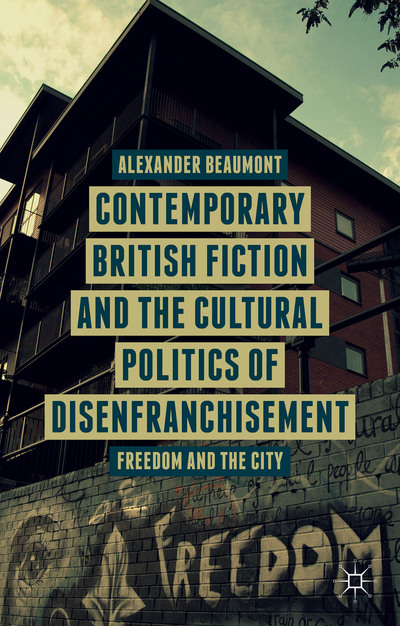Every few weeks we’ll be getting to know more about a member of the @YSJLit programme team by speaking to them about their research and teaching. First up is lecturer Dr Alex Beaumont

What are your research interests?
Postwar British literature, film and television; critical, cultural and literary theory; political philosophy. My broad interest lies in the intersection of culture, politics and space, so I’m generally attracted to anything involving spatial forms of representation, especially literary geography. I started my life as a researcher working on representations of the city, architecture and spatial practice, but I’ve become increasingly interested in how provincialism and regionality interact with simplistic understandings of nationality on the one hand, and, on the other, lofty claims regarding cosmopolitan or ‘global’ forms of political action. More recently I’ve been thinking about archipelagic approaches to British literature, which seek to understand the complex interaction between state, nation and region in the literatures of the North Atlantic Archipelago (often referred to – problematically – as the ‘British Isles’).
What was your last publication about?
My last publication was a monograph entitled Contemporary British Fiction and the Cultural Politics of Disenfranchisement (Palgrave Macmillan 2015). In it I trace the impact of experiments with freedom by Britain’s ‘cultural left’ during the 1980s in contemporary British fiction, and argue that the celebration of the UK’s lively urban subcultures during and after Margaret Thatcher’s period in power has contributed to a political logic which elevates disenfranchisement to the status of a political principle. Practically speaking, this meant that expressive subcultures – music subcultures in particular – were burdened with the expectation that they would develop new forms of political participation for the poor and disenfranchised, which I think is a project that they weren’t really suited to. I argue that the failure of the left to develop specifically political forms of participation during this period contributed to and even accelerated the various forms of disenfranchisement that were part of the Thatcherite – and wider neoliberal – projects. The book includes discussions of Jeanette Winterson, Hanif Kureishi, J.G. Ballard, Ian McEwan, Kazuo Ishiguro, Monica Ali, Zadie Smith and China Miéville.
What are you currently working on?
I’m currently in the early stages of a new project on the location of northern England in nationalist, four nations and archipelagic discussions of ‘British literature’. The referendum on Scottish independence has produced a lot of exciting critical work concerning devolution, constitutionality and political form within the UK, but only a few people are attending to the highly vexed question of region in this debate. I think ‘the north’ (as it’s frequently – and problematically – termed) is a particularly interesting place, because it sometimes inspires calls for regional and even national autonomy, even though, unlike Scotland, Wales and Northern Ireland, it lacks any immediate historical justification for such claims. And yet devolution within England has so far taken the form of handing political power to entities identified in one way or another as ‘northern’, such as the Greater Manchester Combined Authority. I’m interested in the wider implications of this development for the representation of political geography within contemporary writing, so I’m spending quite a lot of time looking at the ways in which regions within northern England are providing a basis for regional autonomy movements, and examining how this interacts with the broader literary tendency to identify northern England itself as culturally, politically, economically, geographically and even topographically distinct from ‘England proper’.
Which modules are you teaching on this year? (UG & MA level)
I teach on the undergraduate modules Writing for Academic Success; Contemporary Writing; Gender and Writing; Literary Theory; Gender, Sexualities and Contemporary Popular Culture. At MA level I teach British Literature – The State of the Art.
Is there a topic or text you especially enjoy teaching?
Although of course I enjoy teaching anything related to my area of research expertise, I particularly enjoy teaching film. On Gender, Sexualities and Contemporary Popular Culture we spend a lot of time examining the interaction between theoretical discussions and cinematic representations of gender and sexuality. This allows me to become my other self for a bit – my film studies self – and I very much enjoy being that person for a while. In terms of a favourite text: on the MA module British Literature – The State of the Art we recently discussed a comic book called Gast by the Welsh artist Carol Swain, which I think is a bit of a masterpiece. The representation of the relationship between silence and landscape in the text is fascinating, and Swain captures emotional complexity in the blank, inexpressive faces of her characters with tremendously clarity.
What do you read for pleasure, when you’re not researching?
I don’t really read for pleasure if I’m honest. Reading is work – work I love, obviously – and if I want to get through everything I feel I need to, and have a life outside work, reading for pleasure can’t really be part of the picture. There are vaguely related activities I enjoy, which don’t form part of my research activities: for example, I love playing video games – mostly because they’re fun, but also because they speak to my interest in the representation of space. So when I want to read for pleasure I’ll often seek out intelligent writing about video games on websites such as Critical Distance and Kill Screen.

